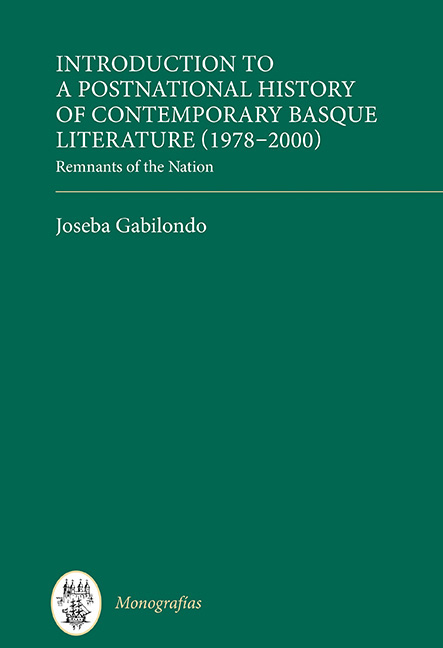 Introduction to a Postnational History of Contemporary Basque Literature (1978–2000)
Introduction to a Postnational History of Contemporary Basque Literature (1978–2000) Book contents
- Frontmatter
- Contents
- Preface and Notes on the Translation
- Acknowledgements
- I Postnational Theory and History
- II Writing the Nation: On Atxaga's Ethiopia and Obabakoak (1978-92)
- 4 Postcolonial and Postnational Literatures: Obabakoak (1988-92)
- 5 On Canon Formation: Ethiopia (1978)
- 6 The Legacy of Modernism: from Ethiopia to Obabakoak
- III After the Nation: Hybrid Postnational Literatures (1992-2000)
- Epilogue: Basque Literatures 2001-17
- Works Cited
- Index
5 - On Canon Formation: Ethiopia (1978)
from II - Writing the Nation: On Atxaga's Ethiopia and Obabakoak (1978-92)
Published online by Cambridge University Press: 06 September 2019
- Frontmatter
- Contents
- Preface and Notes on the Translation
- Acknowledgements
- I Postnational Theory and History
- II Writing the Nation: On Atxaga's Ethiopia and Obabakoak (1978-92)
- 4 Postcolonial and Postnational Literatures: Obabakoak (1988-92)
- 5 On Canon Formation: Ethiopia (1978)
- 6 The Legacy of Modernism: from Ethiopia to Obabakoak
- III After the Nation: Hybrid Postnational Literatures (1992-2000)
- Epilogue: Basque Literatures 2001-17
- Works Cited
- Index
Summary
Canon, Margin, Institutions, and Modernity
Canon
The book of poetry Ethiopia (Etiopia) was published by Bernardo Atxaga in 1978 and was partially translated, with revisions, to Spanish and French with the title Poems and Hybrids (Poemas & Híbridos, 1990; Poèmes & Hybrides, 1995). This poetry book must be studied in light of the evolution that Atxaga's writing has undergone ever since. After all, the renowned author of today is the result of the evolution of that earlier young poet, and this evolution also constitutes the central conduit of Basque literature. In this chapter, I undertake an analysis of Ethiopia from the present to the past. My aim is to grasp the meaning of this historical evolution in order to understand the general situation of contemporary Basque literature, of which Atxaga is a central part.
The Spanish National Award of Narrative awarded to Atxaga in 1989 represents, in the field of literature, the ultimate achievement of a political trend that developed in Basque culture during the late 1970s and throughout the 1980s: Atxaga became officially sanctioned with a prestigious Spanish literary award. ‘Officially’ here makes reference to the Spanish administrative reorganization as a system of regional autonomies (regimen de autonomías), which was the result of the political and historical struggles settled in 1978 with a new democratic constitution. It is this system of regional autonomies, and the web of languages that such a system encompasses, that determined the meaning and value of the term ‘official’.
One could argue that this political process began, at least symbolically, with the explicit references that the first Lehendakari (‘President’) of the Basque Autonomous Community, Karlos Garaikoetxea, and the King of Spain, Juan Carlos, made to two Basque poets: Aresti and Orixe, respectively back in the 1970s and early 1980s. With Atxaga's award the process took an important step further as he became, like no other, the official writer of the Basque Country. From being a friend, colleague, or just another writer among many, suddenly, Atxaga went on to become an official persona with whom all complicity was lost. Certainly, this also prompted a new development: the Spanish public came to know at least one Basque poet, apparently called Achaga, Ashaga or something of that sort, because you know, those strange Basque tx-s and the like do not make for an easy Spanish reading.
- Type
- Chapter
- Information
- Introduction to a Postnational History of Contemporary Basque Literature (1978–2000)Remnants of the Nation, pp. 85 - 114Publisher: Boydell & BrewerPrint publication year: 2019


